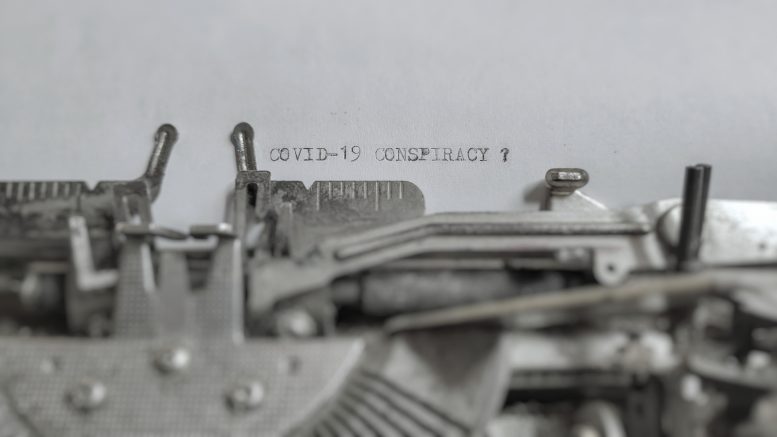by Nathanial Doromal
- If the official narrative were untrue, what paradigms would be invalidated?
Judging the assumptions underlying the official narrative is a very useful exercise, and is also beneficial for clarifying our assumptions regarding the state of reality. In a later example, we examine how the defense of the 5G technology assumes that non-ionizing radiation has no health effects, a critical assumption used to justify the label of “conspiracy theory.”
It is important to note that scientific and sociological beliefs exist within a paradigm, a set of thoughts and concepts about a given phenomenon. A paradigm is useful in clarifying reality, but it can blind us to observations that lie outside the paradigm’s explanatory realm.
- Is a political or ideological agenda being served? If so, what is this agenda?
News and media organizations are increasingly blending reporting with editorializing, often with an ideological bent. Getting the facts becomes increasingly difficult. When you read a piece, it is up to you to separate fact from opinion. Keep your mind attuned for potential political or ideological biases.
A new but relevant ideology that is becoming increasingly common is scientism, the promotion of science in a way that either over-glorifies it or discourages criticism of the utility of science to deal with society’s problems. The scientism ideology leads non-scientists to a blanket acceptance of any scientific recommendations or conclusions without critical questioning of the underlying reasoning. An example is policymakers’ blanket acceptance of COVID-19 lockdowns and widespread masking without sufficient scientific verification regarding whether those recommendations were science- and evidence-based.
Who is propagating the scientism ideology? Scientists, researchers, or companies who are vested in a particular viewpoint are. A classic example is pharmaceutical companies that attack natural remedies as lacking in evidence or people who choose these remedies as lacking in scientific literacy.
- What financial interests or power agendas are served by those who propagate a narrative?
Who financially benefits from propagating a narrative? Companies promote their products, scientists promote their research, and government institutions promote their mission. However, these incentives create pressure to bias or tell only one side of the story.
For example, incumbent news media organizations in the mainstream media wish to be perceived as the dominant news authority. In his article “Who Will Tell the Truth About the So-Called ‘Free Press’?”, author Jeremy R. Hammond writes: “The [New York] Times wishes for the corporate media to preserve their oligopoly in determining what information the public should and should not be made aware of. The Times editors wish to preserve their leadership in determining for us what we should think about any given issue and which issues we should regard as important.”
- Is the burden of proof applied equally for both sides?
If one side demands evidence from the other side, it behooves that side to reciprocate with the same level of proof. It is suspicious when one side (often the more powerful side) tells us that the other side is wrong without providing suitable evidence.
With scientific controversies, it is essential to examine the burden of proof criterion applied to both sides. Dominant players often cherry-pick the evidence to justify a position, ignoring or discounting the evidence against it. In doing so, incumbent players seek to move the burden of proof to those making the novel claims, demanding stringent evidential proof to uphold these claims. Any doubt that is cast is claimed as a lack of evidence, thereby allowing the incumbent players to assume that their position is the default one and removing the onus to provide any evidence to support it.
- What first-hand evidence do we have for both sides?
It is important to consult first-hand evidence and sources regarding any commentary brought up to determine whether the logic is sound. This becomes even more important when the dominant side relies upon its authority or power to make its case.
Sometimes, mainstream news sources will cite a source but misrepresent its meaning to advance a given narrative or ideology. For example, a New York Times article made a case for the flu vaccine but deliberately ignored the modest conclusions over efficacy in an important source it cited, the Cochrane Collaboration.
- How likely are “alternative paradigms” to be true?
Arthur Conan Doyle, the author of Sherlock Holmes, once remarked, “Once you eliminate the impossible, whatever remains, no matter how improbable, must be the truth.” When presented with two sides of a story, we must ascertain whether the dominant paradigm explains all the observed phenomena. If it does not, and unanswered questions remain, we must consider the possibility that there may be some truth to the alternative paradigm.
In summary, the 12 questions above can assist you in a critical evaluation of news stories. These skills are vital when dealing with conspiracy theory claims. Remember that you the reader need to be the ultimate decider.
++++++++++++++++++++++++++++++++
 Like what you’re reading on Vaxxter.com?
Like what you’re reading on Vaxxter.com?
Share this article with your friends. Help us grow.
Join our list here
++++++++++++++++++++++++++++++++
Nate Doromal is an activist and writer within the Vaccine Awareness and Vaccine Safety movement. He is a veteran software engineer, formerly with Google. Doromal now works in finance. He holds an MS and an MBA in Computer Science from the University of Chicago. He holds an Executive MBA from the Smartly Institute. He was originally trained on vaccines and vaccine activism by Dr. Sherri Tenpenny in her Mastering Vaccine Info Bootcamp. He has also studied immunological science extensively with Dr. Tetyana Obukhanych through her Building Bridges Course. He is a contributing writer for Children’s Health Defense.

